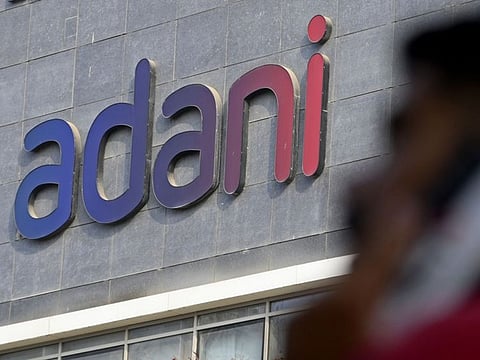Adani rout deepens to $45 billion, pressuring Asia’s richest man
Adani Enterprises lost as much as 9.7%, slipping below the Rs3,276 level

Mumbai: Shares of Adani Group’s companies have lost almost $45 billion in market value in less than two sessions, as a selloff sparked by US short seller Hindenburg Research’s scathing report deepened on Friday.
The rout is putting pressure on billionaire Gautam Adani, Asia’s richest man, as it erodes his net worth and threatens to sour investor sentiment toward the $2.5 billion share sale by his flagship firm Adani Enterprises Ltd. That’s India’s biggest ever primary follow-on public offering.
Some group stocks like Adani Green Energy and Adani Total Gas tumbled 20 per cent each on Friday. Adani Enterprises lost as much as 9.7 per cent, slipping below the Rs3,276 level at which anchor investors were allotted shares in the additional equity sale. Adani stocks had lost $12 billion in market value on Wednesday. Indian markets were shut Thursday.
The new year has started poorly for Adani shares that were among the best performers in Asia in 2022. Adani Enterprises surged over 3,600 per cent in the last five years, a rally that trumped even the likes of Elon Musk’s Tesla, and along with gains in other group shares made Adani Asia’s richest man. Hindenburg isn’t the first research firm to raise concerns around the group. CreditSights, a Fitch Group unit, said in an August report that the conglomerate is “deeply overleveraged” with “stretched balance sheets.”
“The issues strike at the heart of the Indian corporate sector scene where a number of family-controlled conglomerates dominate. By their very nature they are opaque, and global investors have to take on trust the issues of corporate governance,” said Gary Dugan, CEO of the Global CIO Office.
“After last year’s stellar performance, Indian equities and any high-profile company’s shares are open to downside risk of profit-taking. Hence, the broader Indian equity market could be at risk of further downside, with Adani the catalyst.”
India’s benchmark S&P BSE Sensex Index lost more than 1 per cent to be the worst performer in Asia on Friday.
Hindenburg issued a report on January 24 making wide-ranging allegations of corporate malpractice following a two-year investigation into the tycoon’s companies. Adani Group has said it’s exploring legal action after a “maliciously mischievous, unresearched” report by the short seller. Hindenburg has said it fully stands by its report, adding that any legal action taken against it would be meritless, according to a statement on Twitter.
Companies linked to Adani Group plan a detailed response Friday to the report that they labeled as “bogus,” according to bondholders who joined a conference call with Adani executives. On the call, investors were told that the US-based short seller’s assertions of accounting fraud were “devoid of facts.”
“It seems like there might be more downside and this report can become a big legal issue as it is causing reputational damage too,” said Sameer Kalra, founder of Target Investing in Mumbai.
Share sale
The timing of Hindenburg Research’s report has confounded market watchers as it came when Adani Enterprises was seeking to attract a broader network of local and global investors for its share sale. The offering already lured a number of anchor investors before the Hindenburg report became news, though retail investors and high net worth individuals can bid for shares starting today through January 31.
The offering was off to a tepid start, with the portions reserved for retail investors and the company’s employees each getting bids for 1 per cent of the shares on sale as of 11:30 am in Mumbai. The institutional investors’ part had yet to see any bids, stock exchange data showed.
That said, investors in Indian public offerings typically wait until the last day of the sale to place bids.
“Timing is everything for traders in the market, and the current situation with Adani’s FPO launch and the negative report has helped traders capitalize on the situation,” said Deven Choksey, managing director at KRChoksey Holdings in Mumbai.
Sign up for the Daily Briefing
Get the latest news and updates straight to your inbox



